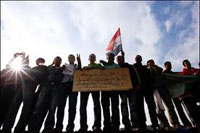 |
One thing I can tell you about Egypt: It is not Las Vegas. What happens in Egypt does not stay in Egypt.
For the last 30 years, that has been the bad news. Egypt was in a state of drift and decline and, as a result, so was the Arab world at large. Egypt has now been awakened by its youth in a unique way - not to fight Israel, or America, but in a quest for personal empowerment, dignity and freedom. In this part of the world, people have very sensitive antennae for legitimacy and authenticity because they have been fed so many lies by their leaders. Because Egypt's democracy revolution is so homegrown because the young people who led it suffered more dead to liberate Egypt than the entire Egyptian Army has suffered since the 1973 war to defend it, this movement here has enormous Arab street cred - and that is why, if it succeeds (and the odds are still long), other young Arabs and Muslims will emulate it.
Indeed, if it can move Egypt to democracy, this movement, combined with social media, will be more subversive to autocratic regimes than Nasserism, Islamism or Baathism combined. What emerged from below in Egypt is, for now, the first pan-Arab movement that is not focused on expelling someone, or excluding someone, but on universal values with the goal of overcoming the backwardness produced by all previous ideologies and leaders.
I understand why Israel is worried; a stable relationship with Hosni Mubarak has given way to a totally uncertain relationship with Egypt's people. But Egypt's stability under Mubarak was at the expense of those people, and they finally had had enough. There will be ugliness aplenty in the days ahead as Egyptians are free to vent. There is still a lot of pent-up fear and anger boiling here. But at least other authentic voices, with a different, more hopeful song, are also emerging.
Every Israeli and Saudi should watch this video made by the youth in Tahrir - about their quest to bring their country "back from the dead."
The Arab tyrants, precisely because they were illegitimate, were the ones who fed their people hatred of Israel as a diversion. If Israel could finalize a deal with the Palestinians, it will find that a more democratic Arab world is a more stable partner. Not because everyone will suddenly love Israel (they won't). But because the voices that would continue calling for conflict would have legitimate competition, and democratically elected leaders will have to be much more responsive to their people's priorities, which are for more schools not wars.
That is why the most valuable thing America could do now is to help Egypt's democracy movement consolidate itself. And the best way to do that would be to speak its language. It would be to announce that the U.S. intends to divert $100 million of the $1.3 billion in military aid to Egypt this year to build 10 world-class science and technology high schools - from Aswan to Alexandria - in honor of all Egyptians who brought about this democratic transformation.
"Nothing would have a bigger impact here," said Ahmed Zewail, the Egyptian-American Nobel Prize laureate in chemistry. Nothing would have a bigger impact on youth across the Middle East.
After all, the Egyptian Army has no external predators today. Egypt's only predators today are poverty and illiteracy. Forty percent of Egyptians live on $2 a day and some 30 percent are illiterate.
On my way back from Tahrir Square on Saturday, I ran into five young Egyptians who were trying to wipe off "Leave Now, Mubarak" graffiti spray-painted on a stone wall. You don't see students removing graffiti very often, so I asked them why. "Because he is not our president anymore," said a youth with the rubber gloves and solvent. They just didn't want to see his name anymore - even as the object of an insult.
As I kept walking to my hotel, I realized why. When I looked down at the Nile embankment - and this was central Cairo - all I saw was garbage strewn about, a crumbling sidewalk and weeds sprouting everywhere. I thought: If this were Sydney, Singapore or Istanbul, the government would have built a beautiful walkway along the banks of the Nile where Egyptians and visitors could stroll with families in the afternoon. Not here.
And that in my view was Mubarak's greatest crime against his people. He had no vision, no high aspiration, no will for great educational attainment. He just had this wildly exaggerated sense of Egypt's greatness based on the past. That is why I feel sorry for those Egyptians now clamoring to get back money they claim the Mubaraks stole. That is surely a crime, if true, but Mubarak is guilty of a much bigger, more profound, theft: all the wealth Egypt did not generate these past 30 years because of the poverty of his vision and the incompetence of his cronies.
"He is a pharaoh without a mummy," the Egyptian playwright Ali Salem said to me of Mubarak. He left little trace. "Every Egyptian citizen is carrying inside them 100 short stories of pain and novels of grievance. Everyone has to pay for their children to take private lessons after school because the schools are so bad. Can you imagine? You prevent yourself from eating to pay for private lessons?" At least these rebellious youth, he added, "don't know the rules, so they are not afraid of anything. They can do what our generation did not dare to think of."
Source: The New York Times - Thomas Friedman